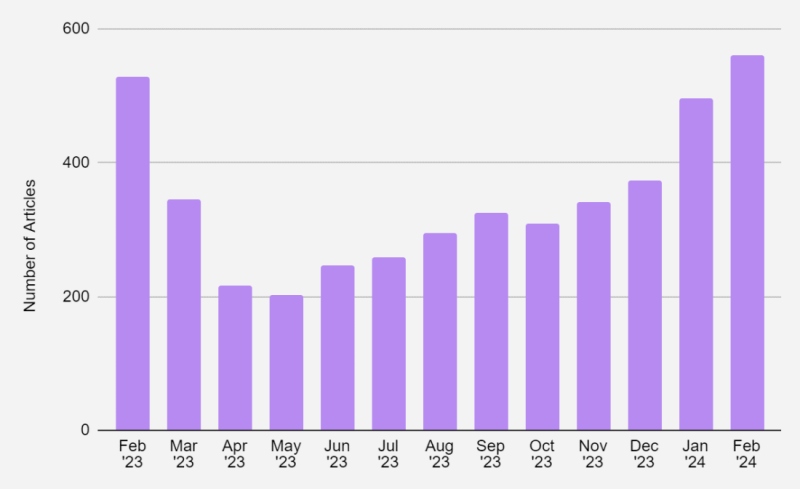Introduction
Between 1 February and 31 February, references to 'adult social care' appeared in 561 unique media articles across the UK, a figure nearly 13 per cent higher than December's coverage statistics, which stood at 497 articles.
For context, the chart below plots mentions of adult social care on a month-by-month basis over the past 12 months.

Coverage in February focused on several key recurring themes concerning the problems facing local government in financing social care provision. Related to this has been an increase in coverage regarding the increases in council tax bills being issued as a means of meeting rising social care demand.
Several newspapers, including The Independent and The Times, focused on the recent publication of a major report from levelling up, housing and communities committee. The report revealed that social care funding now consumes around 70 per cent of top-tier council spending and that local government faces a £4 billion funding gap for 2024-25, which, if not bridged, will lead to further council 'bankruptcies'. The committee have also called for a more sustainable funding settlement for local authorities in the medium term, with revaluing council tax bands seen as integral to that process.
Learning Disability Today reported on the likely effects of further local authorities issuing Section 114 notices and how this can spill over into social care funding.
According to Community Care, the 14th consecutive year of frozen thresholds for government-funded care has meant tens of thousands more have to pay fully for their care.
Meanwhile, The King's Fund has published a new report into social care, which calls for radically refocusing public spending, placing primary and community care at its core to promote a more sustainable and effective system.
In other news, BBC News reported that Cambridgeshire County Council will increase council tax by 4.99 per cent this year, the maximum allowed.
The Guardian - English councils need £4bn to prevent widespread bankruptcy, MPs say
The levelling up, housing and communities committee has warned the government it needs to inject £4 billion into local authorities to stave off widespread ‘bankruptcies’. Without bridging the gap in local government funding, further cuts to local services, particularly reductions in social care expenditure, which now accounts for 70 per cent of top-tier council spending, will be required.
Community Care - More people face self-funding care as means-testing thresholds frozen for 14th consecutive year
Thousands more people will be forced to pay for their own care as the capital limits that determine the level of state support given remain frozen for the fourteenth year in a row. This means people with assets worth more than £23,250 will continue having to fully fund their care unless their council sets a more generous threshold, which very few do.
Care Home Professional - Make care ‘closer to home’ to fix sector, urges new report
A new study from The King's Fund calls for care services to be reformed and brought 'closer to home' through greater attention to primary and community care. Doing so would relieve pressure on hospitals struggling to meet demand for health services with an already stretched and limited capacity. However, the report notes that it shouldn't be taken as an excuse for service cuts. Savings are unlikely in the short term, but care services will be further strained without reform and continue to exert a knock-on impact on the NHS.
BBC News - Cambridgeshire County Council will increase its share of tax by 4.99%
Cambridgeshire County Council announces a new council tax rise of 4.99%, the maximum allowed with 2% to be used for adult social services, raising £17.5 million for social care. The difficulty Cambridgeshire County Council has in protecting its budget highlights continued concern over the sustainability of local government finances and the growing number of councils issuing Section 114 notices.
Learning Disability Today - When local councils go bust: who really pays the price?
The annual 2023 Sector Pulse Check report by Hft and Care England already revealed that care providers are grappling with staff shortages and financial constraints and two in five (40%) providers reported a deficit, with 43% forced to close a part of their organisation or hand back contracts. Further cuts mean social care providers must make difficult financial decisions about reducing their capacity or exiting the market, leading to a lack of care options.



